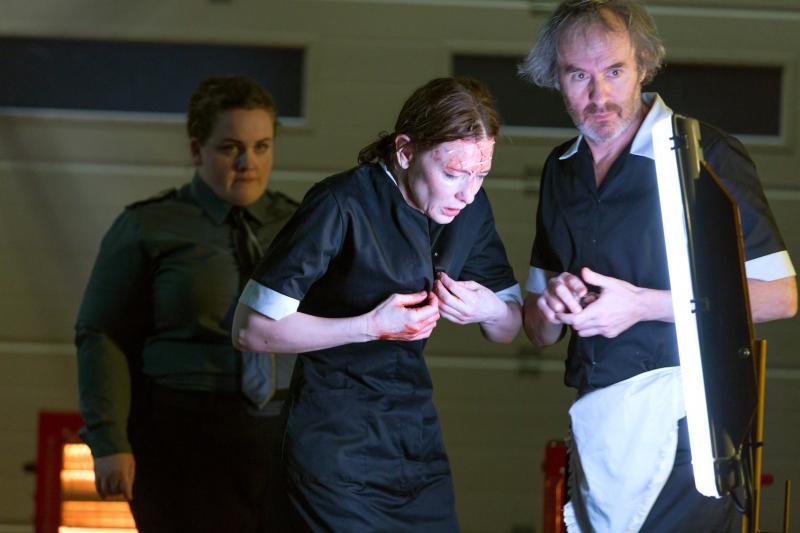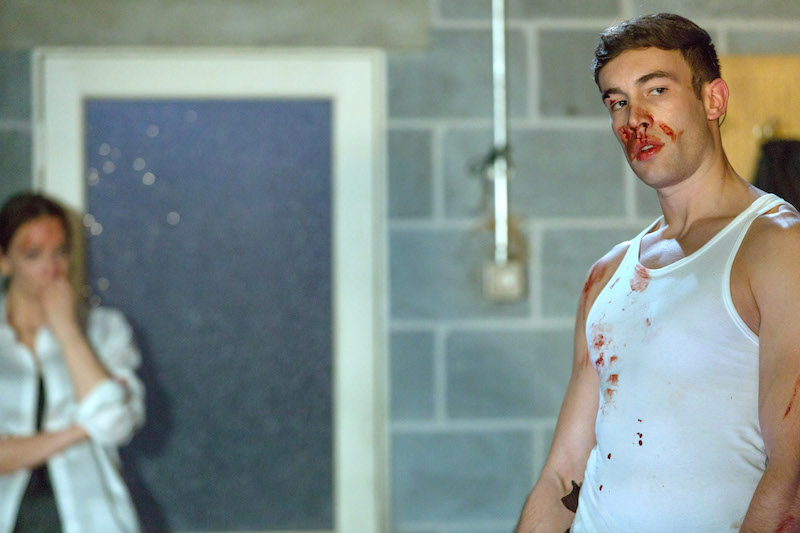When We Have Sufficiently Tortured Each Other, Dorfman Theatre review - Cate Blanchett's underwhelming debut at the National | reviews, news & interviews
When We Have Sufficiently Tortured Each Other, Dorfman Theatre review - Cate Blanchett's underwhelming debut at the National
When We Have Sufficiently Tortured Each Other, Dorfman Theatre review - Cate Blanchett's underwhelming debut at the National
Martin Crimp's latest about a sex game is all talk and no action

When it was announced that Cate Blanchett was making her National Theatre debut with Martin's Crimp's new play, When We have Sufficiently Tortured Each Other, its website exploded with people wishing to buy tickets. To those many thousands disappointed, I say: “Well done, you!”
The play's subtitle is “Twelve Variations on Samuel Richardson's Pamela”, so it certainly starts from an interesting place. The epistolary novel from 1740, subtitled “Or, Virtue Rewarded”, concerns a young maid, Pamela, whose master, Mr B, makes frequent and unwanted sexual advances to her. After many refusals, he eventually proposes marriage in an equitable partnership as her “reward”.
The programme notes – unlike the play itself – tease us by saying it “breaks through the surface of contemporary debate to explore the messy, often violent nature of desire and the fluid, complicated roles that men and women play”. Oh, would that it had.
The action is set in the garage of a suburban house where we eventually gather that Blanchett (as Woman) and co-star Stephen Dillane (Man) live. She has readied herself for his arrival, with four other people who take part in an elaborate sado-masochistic role play to inject some energy into the couple's sex life.
 Man and Woman bicker and insult each other, but few barbs land. They frequently swap clothing (down to slinky black undies and "sexy maid" outfits) and blonde wig as they flit between playing Mr B and Pamela in a stultifyingly boring game about power and domination that lacks any titillation for either the characters or the audience. They try to get a reaction out of each other, fail, try again, repeat. For two hours.
Man and Woman bicker and insult each other, but few barbs land. They frequently swap clothing (down to slinky black undies and "sexy maid" outfits) and blonde wig as they flit between playing Mr B and Pamela in a stultifyingly boring game about power and domination that lacks any titillation for either the characters or the audience. They try to get a reaction out of each other, fail, try again, repeat. For two hours.
Man and Woman talk about their relationship – a lot – but the parallels one was hoping that Crimp may have drawn between Richardson's time and now in the age of #MeToo, the gender pay gap, and the balance of power between men and women in heterosexual relationships and society more broadly, while touched on, aren't developed. Katie Mitchell's languorous direction doesn't help matters.
There's little to shock here; certainly not having two young actresses playing teenage Girl 1 and Girl 2 (Emma Hindle and Babirye Bukilwa respectively) to plant the possibility of paedophilia in the audience's minds, or introducing a whiff of lesbianism between Woman and Mrs Jewkes (the complicit housekeeper in the novel). Even the violent scenes, mostly played out through the character of young hunk Ross (Craig Miller, pictured above), feel half-hearted.
Blanchett and Dillane give committed performances that the script doesn't merit, but even so, some of the audience woke with a start at the end. (Although if they were snoozing they may have missed a few darkly comic lines delivered with verve by Gunning.)
The denouement, with its lazy reveal, feels a long time coming, and the sexual action, for what it is, is desultory and hardly provocative. As a friend remarked after the show: “It takes a special kind of badness to make Cate Blanchett lubing up a strap-on boring, but the National Theatre managed it.” And that was the best line I heard all evening.
- When We have Sufficiently Tortured Each Other is at the Dorfman Theatre until 2 March
- Read more theatre reviews on theartsdesk
rating
Share this article
The future of Arts Journalism
You can stop theartsdesk.com closing!
We urgently need financing to survive. Our fundraising drive has thus far raised £49,000 but we need to reach £100,000 or we will be forced to close. Please contribute here: https://gofund.me/c3f6033d
And if you can forward this information to anyone who might assist, we’d be grateful.

Subscribe to theartsdesk.com
Thank you for continuing to read our work on theartsdesk.com. For unlimited access to every article in its entirety, including our archive of more than 15,000 pieces, we're asking for £5 per month or £40 per year. We feel it's a very good deal, and hope you do too.
To take a subscription now simply click here.
And if you're looking for that extra gift for a friend or family member, why not treat them to a theartsdesk.com gift subscription?
more Theatre
 Top Hat, Chichester Festival Theatre review - top spectacle but book tails off
Glitz and glamour in revived dance show based on Fred and Ginger's movie
Top Hat, Chichester Festival Theatre review - top spectacle but book tails off
Glitz and glamour in revived dance show based on Fred and Ginger's movie
 Edinburgh Fringe 2025 reviews: Alright Sunshine / K Mak at the Planetarium / PAINKILLERS
Three early Fringe theatre shows offer blissed-out beats, identity questions and powerful drama
Edinburgh Fringe 2025 reviews: Alright Sunshine / K Mak at the Planetarium / PAINKILLERS
Three early Fringe theatre shows offer blissed-out beats, identity questions and powerful drama
 The Daughter of Time, Charing Cross Theatre review - unfocused version of novel that cleared Richard III
The writer did impressive research but shouldn't have fleshed out Josephine Tey’s story
The Daughter of Time, Charing Cross Theatre review - unfocused version of novel that cleared Richard III
The writer did impressive research but shouldn't have fleshed out Josephine Tey’s story
 Evita, London Palladium review - even more thrilling the second time round
Andrew Lloyd Webber's best musical gets a brave, biting makeover for the modern age
Evita, London Palladium review - even more thrilling the second time round
Andrew Lloyd Webber's best musical gets a brave, biting makeover for the modern age
 Maiden Voyage, Southwark Playhouse review - new musical runs aground
Pleasant tunes well sung and a good story, but not a good show
Maiden Voyage, Southwark Playhouse review - new musical runs aground
Pleasant tunes well sung and a good story, but not a good show
 The Winter's Tale, RSC, Stratford review - problem play proves problematic
Strong women have the last laugh, but the play's bizarre structure overwhelms everything
The Winter's Tale, RSC, Stratford review - problem play proves problematic
Strong women have the last laugh, but the play's bizarre structure overwhelms everything
 Brixton Calling, Southwark Playhouse review - life-affirming entertainment, both then and now
Nostalgic, but the message is bang up to date
Brixton Calling, Southwark Playhouse review - life-affirming entertainment, both then and now
Nostalgic, but the message is bang up to date
 Inter Alia, National Theatre review - dazzling performance, questionable writing
Suzie Miller’s follow up to her massive hit 'Prima Facie' stars Rosamund Pike
Inter Alia, National Theatre review - dazzling performance, questionable writing
Suzie Miller’s follow up to her massive hit 'Prima Facie' stars Rosamund Pike
 A Moon for the Misbegotten, Almeida Theatre review - Michael Shannon sears the night sky
Rebecca Frecknall shifts American gears to largely satisfying effect
A Moon for the Misbegotten, Almeida Theatre review - Michael Shannon sears the night sky
Rebecca Frecknall shifts American gears to largely satisfying effect
 Burlesque, Savoy Theatre review - exhaustingly vapid
Adaptation of 2010 film is busy, bustling - and bad
Burlesque, Savoy Theatre review - exhaustingly vapid
Adaptation of 2010 film is busy, bustling - and bad
 Don't Rock the Boat, The Mill at Sonning review - all aboard for some old-school comedy mishaps
Great fun, if more 20th century than 21st
Don't Rock the Boat, The Mill at Sonning review - all aboard for some old-school comedy mishaps
Great fun, if more 20th century than 21st
 The Estate, National Theatre review - hugely entertaining, but also unconvincing
Comedy debut stars Adeel Akhtar, but is an awkward mix of the personal and the political
The Estate, National Theatre review - hugely entertaining, but also unconvincing
Comedy debut stars Adeel Akhtar, but is an awkward mix of the personal and the political

Add comment